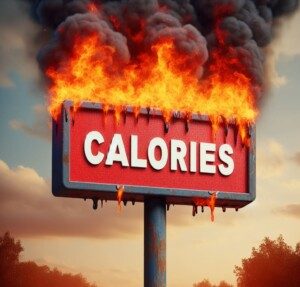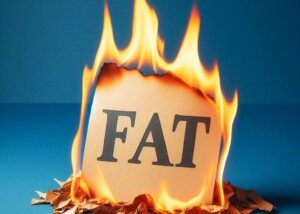
It’s okay to want to lose excess fat, but think again if you believe that tracking the calorie burn of all your daily activities will help you lose weight.
Do you often refer to “calories burned” charts of various daily activities?
I don’t mean exercise such as jogging 5 mph, but any day-to-day activity that’s simply a part of living.
It seems that the only activity whose calorie burn is not published somewhere is walking on the moon.
There are calorie listings for every kind of household task, for both sitting while doing it and standing.
There’s even a calorie count for butchering animals!
Knowing the Calories Burned for Any Activity Will Not Help You Lose Weight
It’s one thing to track calories of food intake. This really DOES work for individuals who are drawn to orderliness, details and analysis – the same type of brain that finds number crunching and doing one’s own taxes easy.
But knowing how many calories vacuuming or mopping for an hour burns will not help you bust body fat.

Freepik.com
A really great thing you can do for yourself is to avoid getting addicted to keeping track of calories burned and feeling you must account for every single thing you do once you’re out of bed in the morning.
This is no way to live, and it’s not key to permanent fat loss!
It’s easy to find online the “calories burned” for nearly any action you can think of, such as (no joke) watering houseplants, feeding your dog, washing your hair and even knitting! Is this insane or what?
Instead of worrying, fixating or obsessing about how many calories you’ll be burning today, why not instead make your weight loss goal a whole lot easier by ADDING to your life an activity that burns a lot of calories?
Exercise that Burns a Lot of Calories
Running
Incline jogging
Sled push and pull workouts
Intense deadlifting and squatting
Boot camp fitness and CrossFit classes
Cross country skiing
The above list is not complete, but surely, you can see how it makes knowing the calorie burn of watering plants or pouring dog food into a bowl become extremely meaningless.
Calories Burned from 15 Minutes of Ironing
Don’t even go there. This obsession will run you ragged.
If you’re drawn to numbers, then get familiar with the number of fiber grams in half a cup of lentils, or what the optimal cholesterol numbers are.
Overweight? You’ve already been performing the activities of daily living – yet are overweight and wish to trim down.
You have excess body fat NOT because you haven’t been ironing, watering plants, blow-drying your hair (yes, there’s a calorie-burn for this, too), butchering animals, mopping, washing dishes or vacuuming.
Heavens, there are 300-pound people who conduct these tasks every day, and will still be doing so a year from now, and will STILL weigh 300+ pounds a year from now.

This is not to be celebrated. © Lorra Garrick
Again, if you’re drawn to tracking numbers, there are numbers other than the calories burned from brushing your teeth that you should take note of, such as your blood pressure numbers and the quantity of weights you can lift at the gym!
How many different things do you do every day? If you were to write down every task that cropped up, such as pushing a shopping cart across a parking lot, you’d be shocked at how many different things you did come nighttime.
You’d have to then hunt for the calorie-burn for all of those activities.
If you failed to locate the calorie expenditure for a particular activity, you’d then go nuts wondering what it was and how to fill in that gap when it was time to add up the day’s total. This would blow a circuit even in a robot.
What about automatic calorie trackers?
These can’t tell if the movement (you name it) is coming from a 25-year-old male bodybuilder with a super fast metabolism or a 50-year-old sedentary woman with a sluggish metabolism.
Tracking Your Daily Calorie Burn Will Not Speed Up Your Metabolism
It won’t change a thing about your body. For instance, if you know how many calories certain household chores use up, will this knowledge magically accelerate your resting metabolism? NO.
The key to weight loss is adding a variable – a variable that’s powerful enough to raise your resting metabolic rate, such as intense and scheduled exercise.
Mistakes with Calorie Tracking
You may accidentally overestimate the values. For example, was your walking pace truly “brisk” or just moderate?
Another example is the calorie expenditure of “carrying children” for 15 minutes.
Does the calorie tracker give weights for those children? Certainly, carrying a two-year-old is easier than carrying a heavier four-year-old.
Does the calorie tracker account for whether the child is asleep or fidgeting, which would affect the effort (and thus, calorie expenditure) of carrying him? You might then think:
“Oh, he’s a heavy boy and was fighting me all the way while I was carrying him, so I’ll tack on another hundred calories!”
If you ultimately become immersed in this arduous venture, you’ll want to ask yourself if it’s because it gives you a sense of control – control over a life in which you feel totally out of control.
 Lorra Garrick is a former personal trainer certified through the American Council on Exercise. At Bally Total Fitness she trained women and men of all ages for fat loss, muscle building, fitness and improved health.
Lorra Garrick is a former personal trainer certified through the American Council on Exercise. At Bally Total Fitness she trained women and men of all ages for fat loss, muscle building, fitness and improved health.
.








































